- Home
- Philip MacDonald
The Rasp Page 4
The Rasp Read online
Page 4
Between them they raised the clock. Anthony opened the case and set the pendulum swinging. A steady tick-tock began at once.
Anthony looked at his watch. ‘Stopped exactly twelve hours ago, did grandfather,’ he said. ‘Doesn’t seem to be damaged, though.’
‘No, sir. It takes a lot to put those old clocks out of order.’
Anthony went back to the front of the sofa and stood looking down at the carpet.
‘No fingerprints, you said?’
‘Except on the wood-rasp, absolutely none but those of the deceased, sir. I’ve dusted nearly every inch of the room with white or black. All I got for my pains were four good prints of the deceased’s thumb and forefinger. They’re easy enough to tell—very queer-shaped fingers and a long scar on the ball of his right thumb.’
Anthony changed the subject. ‘What time did you get here, Boyd?’
‘About four this morning. We came by car. I made some preliminary inquiries, questioned some of the people, and went down to the village at about eight.’
‘Who’s that great red hulk of a sergeant?’ said Anthony, flitting to yet another subject. ‘You ought to watch him, Boyd. When I came along he was indulging in a little third degree.’
‘I heard it, sir. That’s why I came in.’
‘Good. Who was the timid little ferret?’
‘Belford—Robert Belford, sir. He’s a sort of assistant to Poole and was valet to the deceased.’
‘How did he answer when you questioned him?’
‘Very confused he was. But his story’s all right—very reasonable. I don’t consider him, so to speak. He hasn’t got the nerve, or the strength.’
Anthony stroked his chin. ‘It’s easy enough to see,’ he said, ‘that you don’t want to be persuaded away from your idea that an outsider did this job.’
‘You’re right, sir,’ Boyd smiled. ‘As far as I’ve progressed yet an outsider’s my fancy. Most decidedly. Still, one never knows where the next turning’s going to lead to, so to speak. Of course, I’ve got a lot of inquiries afoot—but so far we’ve less than nothing to go on.’
‘Anything stolen?’
‘Nothing.’
Anthony was still gazing down at the carpet before the sofa. Again he dropped on one knee. This time he rubbed at the thick pile with his fingers. He rose, darting a look round the room.
‘What’s up, sir?’ Boyd was watching attentively.
‘A most convenient struggle that,’ murmured Anthony.
‘What’s that? What d’you mean, sir?’
‘I was remarking, O Boyd, that the struggle had been, for the murderer, of an almost incredible convenience. Observe that the two chairs which were overturned are far from heavy; observe also that the carpet is very far from thin. These light chairs fell, not, mark you, on the parquet edging of the floor, but conveniently inwards upon this thickest of thick carpets. Observe also, most puissant inspector, that the articles dislodged from the writing-table, besides falling on the carpet, are nothing but light books and papers. Nothing heavy, you see. Nothing which would make a noise.’
‘I follow you, sir,’ Boyd cried. ‘You mean—’
‘’Ush, ’ush, I will ’ave ’ush! I would finally direct your attention to the highly convenient juxtaposition of this sofa here and our friend the clock. This sofa is a solid, stolid lump of a sofa; it’s none of your trifling divans. In fact, it would require not merely a sudden jerk but a steady and lusty pull to move it, wouldn’t it?’
The detective applied his considerable weight to the arm of the sofa. Nothing happened.
‘You see!’ continued Anthony with a gesture. ‘See you also then the almost magical convenience with which, in the course of the struggle, this lumping sofa was moved back towards grandfather, who stood nearly three feet from the sofa’s usual position, which position can be ascertained by noting these four deep dents made in the carpet by the castors. Oh, it’s all so convenient. The sofa’s moved back, then grandfather falls, not with a loud crash to the floor but quietly, softly, on to the back of the sofa. Further, those two vases on that table there beside the clock weren’t upset at all by the upheaval. Those vases wobble when one walks across the room, Boyd. No, it won’t do; it won’t do at all.’
‘You’re saying there wasn’t any struggle at all; that the scene was set, so to speak.’ Boyd’s tone was eager. His little grey eyes were alight with interest.
Anthony nodded. ‘Your inference is right.’
‘I had explained things to myself by saying that the carpet was thick and old Poole rather deaf,’ said the detective, ‘because he did say that he heard a noise like someone walking about. Of course, he just thought it was his master. I’ll wager it wasn’t, though. I’m sure you’re right, sir. I hadn’t noticed the sofa had been shifted. This is a very queer case, sir, very queer!’
‘It is, or anyhow it feels like that. What about the body, Boyd? Aren’t you going to have it moved?’
‘Yes, sir, any time now. It was going to be moved before you came; then Jardine wanted to take some more photos. After that, you being here, sir—well, I thought if you were going to have anything to do with the case you might like to see everything in status quo, so to speak.’
Anthony smiled. ‘Thanks, Boyd,’ he said. ‘You’re a good chap, you know. This isn’t the first job we’ve done together by any means; but all the same, it’s most refreshing to find you devoid of the pro’s righteous distrust of the amateur.’
Boyd smiled grimly. ‘Oh, I’ve got that all right, sir. But I don’t regard you in that light, if I may say so, though we may disagree before this case is over. And—well, sir, I’ve not forgotten what you did for me that night down at Sohlke’s place in Limehouse—’
‘Drop it, man, drop it,’ Anthony groaned.
Boyd laughed. ‘Very well, sir. Now I’ll go and see about having the body moved upstairs.’
‘And I,’ said Anthony, ‘shall think—here or in the garden. By the way, when’s the inquest?’
‘Tomorrow afternoon, here,’ said Boyd, and left the room.
Anthony ruminated. This study of Hoode’s, he reflected, was curious, being in itself the end of the longer wing of the house and having, therefore, window or windows in all three sides. As Boyd had said, only one of these windows was open, the farthest from the door of the three which looked out upon the terraced gardens and the river at their foot. All the others—two in the same wall, one in the end wall, and two overlooking the drive—were shut and latched on the inside. The open one was open top and bottom.
Anthony looked at it, then back at the writing-table. He seemed dissatisfied, for he next walked to the window, surveyed the room from there, and then crossed to the swivel-chair at the writing-table and sat down. From here he again peered at the open window, which was then in front of him and slightly to his left.
He was still in the chair when Boyd came back, bringing with him a policeman in plain clothes and a man in the leather uniform of a chauffeur. Anthony did not move; did not answer when Boyd spoke to him.
The body covered and lifted, the grim little party, Boyd leading, made for the door. As they steered carefully through it, the grandfather clock began to strike the hour. Its deep ring had, it seemed to Anthony, a note ominous and mournful.
The door clicked to behind the men and the shrouded thing they carried. The clock struck again.
‘Good for you, grandfather,’ muttered Anthony, without turning in his chair to look. ‘I wish to High Heaven you could talk for a moment or two.’
‘Bong!’ went the clock again.
Anthony pulled out his watch. The hands stood at eleven o’clock. ‘All right, grand-dad,’ he said. ‘You needn’t say any more. I know the time. I wish you could tell me what happened last night instead of being so damned musical.’
The clock went on striking. Anthony wandered to the door, paused; and went back to the writing-table. As he sat down again the clock chimed its final stroke.
He felt a va
gue discomfort, shook it off and continued his scrutiny of the table. It was of some age, and beautiful in spite of its solidity. The red leather covering of its top had upon it many a stain of wear and inks. Yet one of these stains seemed to differ from the general air of the others. He rubbed it with his fingers. It was raised and faintly sticky. It was at the back of the flat part of the table-top. Immediately behind it rose two tiers of drawers and pigeon-holes. Also, its length was bisected by a crack in the wood.
He rubbed at the stain again; then cursed aloud. That vague sense of something wrong in the room, something which did not fit, the essential sanity of life, had returned to his head and spoilt these new thoughts.
The door opened and shut. ‘What’s the matter, sir? Puzzled?’ Boyd came and stood behind him.
‘Yes, dammit!’ Anthony swung round impatiently. ‘This room’s getting on my nerves. Either there’s something wrong in it or I’ve got complex fan-tods. Never mind that, though. Boyd, I think I’m going to give you still more proof that there was no struggle. Come here.’
Boyd came eagerly. Anthony twisted round to face the table again.
‘Attend! The body was found over there by the fireplace. If one accepts as true the indications that a struggle took place, the natural inference is that Hoode was overpowered and struck down where he was found. But we have found certain signs that lead us to believe that the struggle was, in fact, no struggle at all, and here, I think, is another which will also show that Hoode’s body was dragged over to the hearth after he had been killed.’
Boyd grew excited. ‘How d’you mean, sir?’
‘This is what I mean.’ Anthony pointed to the stain he had been examining. ‘Look at this mark here, where my finger is. Doesn’t it look different to the others?’
‘Can’t say that it does to me, sir. I had a look over that table myself and saw nothing out of the ordinary run.’
‘Well, I beg to differ. It not only looks different, it feels different. I notice these things. I’m so psychic, you know!’
Boyd grinned at the chaff, watching with keen interest as Anthony opened a penknife and inserted the blade in the lock of the table’s middle drawer.
‘I think,’ said Anthony, ‘that this is one of those old jump locks. Aha! it is.’ He pulled open the drawer. ‘Now, was that stain different? Voilà! It was.’
Boyd peered over Anthony’s shoulder. The drawer was a long one, reaching the whole width of the table. In it were notebooks, pencils, half-used scribbling pads, and, at the back, a pile of notepaper and envelopes.
On the white surface of the topmost envelope of the pile was a dark, brownish-red patch of the size, perhaps, of a half-crown. Boyd examined it eagerly.
‘You’re right, sir!’ he cried. ‘It’s blood right enough. I see what you were going to say. This is hardly dry. It must have dripped through that crack where the stain you pointed out was. And the position of that stain is just where the deceased’s head would have fallen if he had been sitting in this chair here and had been hit from behind.’
‘Exactly,’ said Anthony. ‘And after the first of those pats on the head Hoode must’ve been unconscious—if not dead. Ergo, if he received the first blow sitting here, as this proves he did, there was no struggle. One doesn’t sit down at one’s desk to resist a man one thinks is going to kill one, does one? What probably happened is that the murderer—who was never suspected to be such by Hoode—got behind him as he sat here, struck one or all of the blows, and then dragged the body over to the hearth to lend a touch of naturalness to the scene of strife he was going to prepare. He must be a clever devil, Boyd. There’s never a stain on the carpet between here and the fireplace. There wouldn’t have been on the table either, only he didn’t happen to spot it.’
The detective nodded. ‘I agree with you entirely, sir.’
But Anthony did not hear him. That wrong something was troubling him again. He clutched his head, trying vainly to fix the cause of this feeling.
Boyd tried again. ‘Well, we know a little more now, sir, anyhow. Quite a case for premeditation, so to speak—thanks to you.’
Anthony brought himself back to earth. ‘Yes, yes,’ he said, ‘But hearken again, Boyd. I have yet more to say. Don’t wince, I have really. Here it is. Assuming the reliability as a witness of Poole, the old retainer, we know the murderer didn’t come into this room through the door. Nor could he, as you’ve explained, have used the chimney. Remains the one window that was open. Observe, O Boyd, that that window is in full view of a man seated at this table. Now one cannot come through a window into a room at a distance of about two yards from a man seated therein at a table without attracting the attention of that man unless that man is asleep.’
‘I shouldn’t think Hoode was asleep, sir.’
‘Exactly. It is known that Hoode was a hard worker. Further, if I’m not mistaken, he’s been more than usually busy just recently—over the new Angora Agreement. I think we can take it for granted he wasn’t asleep when the murderer came in through that window. That leads us to something of real importance, namely, that Hoode was not surprised by the entry of the murderer.’
Boyd scratched his head. ‘’Fraid I don’t quite get you, as the Yanks say, sir.’
Anthony looked at him with benevolence. ‘To make myself clearer, I’ll put it like this: he either (i) expected the murderer—though not, of course, as such—and expected him to enter that way; or (ii) did not expect him to enter that way, but on looking up in surprise saw someone who, though he had entered in that unfamiliar way, was yet so familiar in himself as not to cause Hoode to remain long, if at all, out of his seat. Personally, I think he didn’t leave his chair at all. Is not all this well spoken, Boyd?’
‘True enough, sir. I think you’re quite right again. I’ve been a fool.’ Boyd was dejected. ‘Of the two views you propounded, so to speak, I think the first’s the right one. The murderer was an outsider, but one the deceased was expecting—and by that entrance.’
‘And I,’ said Anthony, ‘incline strongly toward my second theory of the unconventional entry of the familiar.’
Boyd shook his head. ‘You’d hardly credit it, sir,’ he said solemnly, ‘but some of these big men get up to very funny games. I’ve had over twenty years in the C.I.D., and I know.’
‘The mistake you’re making in this case, Boyd,’ Anthony said, ‘is thinking of it as like all your others. From what little I’ve seen so far of this affair it’s much more like a novel than real life, which is mostly dull and hardly ever true. As I asked you before, d’you ever read detective stories? Gaboriau, for instance?’
‘Lord, no, sir!’ smiled the real detective.
‘You should.’
‘Pardon me, sir, but you’re a knock-out at this game yourself and it makes me wonder, so to speak, how you can hold with all that ’tec-tale truck.’
‘A knock-out? Me?’ Anthony laughed. ‘And I feel as futile as if I were Sherlock Holmes trying to solve a case of Lecoq’s.’ He put a hand to his head. ‘There’s something about this room that’s haunting me! What is the damned thing? Boyd, there’s something wrong about the blasted place, I tell you!’
Boyd looked bewildered. ‘I don’t know what you mean, sir.’ Then, to humour this eccentric, he added: ‘Ah! if only this furniture could tell us what it saw last night.’
‘I said that to the clock,’ said Anthony morosely. Then suddenly: ‘The clock, the clock! Grandpa did tell me something! I knew I’d seen or heard something that was utterly wrong, insane. The clock! Good God Almighty! What a fool not to think of it before!’
Boyd became alarmed. His tone was soothing. ‘What about the clock, sir?’
‘It struck. D’you remember it beginning when you were taking the body away?’
‘Yes.’ Boyd was all mystification.
‘What time was that?’
‘Why, eleven, of course, sir.’
‘Yes, it was, my canny Scot. But grandfather said twelve. I was thinking about some
thing else, I must have counted the strokes unconsciously.’
‘But—but—are you sure it struck twelve when’—Boyd glanced up at the old clock—‘when it said eleven?’
Anthony crossed the room, opened the glass casing of the old clock-face, and moved the hands on fifteen minutes. They stood then at twelve.
‘Bong!’ went the clock.
They waited. It did not strike again.
Anthony was triumphant. ‘There you are, Boyd! Grandpa looks twelve and says one. There’s another strand of that rope you’re making for the murderer. Miss Hoode came in here at eleven-ten, to find the murder done and the murderer gone. Your time’s almost fixed for you. He wasn’t here at eleven-ten, but he was here after eleven, because, to put the striking of that clock out as it is, the murderer must have put back the hands after the hour—eleven, that is—had struck. If he’d done it before the striking had begun, grand-dad wouldn’t be telling lies the way he is.’
Boyd’s expression was a mixture of elation and doubt. ‘I suppose that’s right, sir,’ he said. ‘About the striking, I mean. Yes, of course it is; just for the moment I was a bit confused, so to speak. Couldn’t work out which way the mistake would come.’
‘It seems to me,’ said Anthony, ‘that the whole reason he faked this elaborate struggle scene was in order that the clock could be stopped under what would seem natural circumstances. But why, having stopped the clock, did he alter it? Two reasons occur to me. One is that he merely wished to make it seem that the murder was done at any other time except that when it really was. That’s rather weak, and I prefer my second idea. That is, that the time to which he moved the hands has a significance and wasn’t merely a chance shot. In other words, he set the thing at ten-forty-five because he had a nice clean alibi for that time. Judging by the rest of his work he’s a man of brains; and that would’ve been a pretty little safeguard—if only he hadn’t made that mistake about the striking.’
‘They all make bloomers—one time or another, sir. That’s how we catch ’em in the main.’

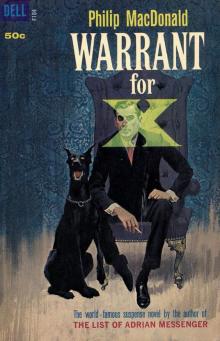 Warrant for X
Warrant for X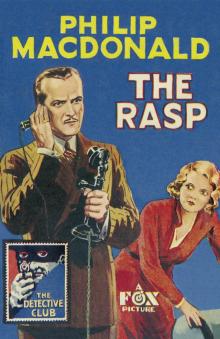 The Rasp
The Rasp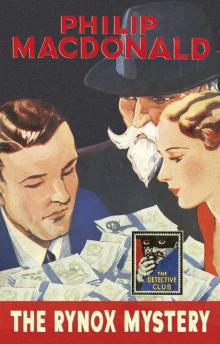 The Rynox Mystery
The Rynox Mystery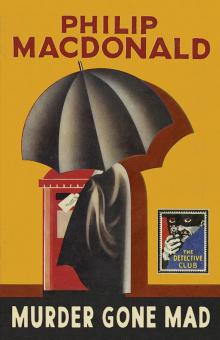 Murder Gone Mad
Murder Gone Mad The Maze
The Maze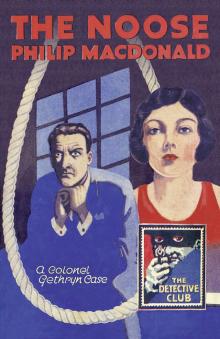 The Noose
The Noose